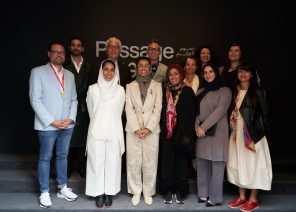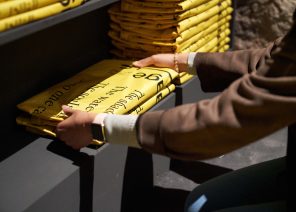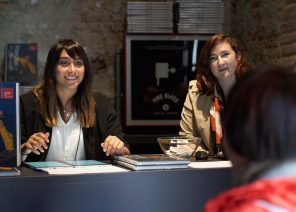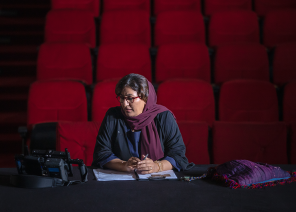2019
National Pavilion UAE unveils Passage, an immersive, site-specific video installation by poet and filmmaker Nujoom Alghanem, at the 58th International Art Exhibition – La Biennale di Venezia

7 May 2019, Abu Dhabi and Venice: The National Pavilion UAE’s exhibition at the 58th International Art Exhibition – La Biennale di Venezia opens to the public this week with Passage, an immersive, 26- minute, two-channel video and twelve-channel sound installation by poet, filmmaker and artist Nujoom Alghanem. Filmed in the UAE and in Venice, the site-specific work has been closely conceived and developed with the Pavilion curators Sam Bardaouil and Till Fellrath.
Passage expands Nujoom Alghanem’s experimentation with contemporary Arabic poetry through the language of film. Taking her quintessential 2009 poem, The Passerby Collects the Moonlight, as a point of departure, this installation explores the universal experience of displacement.
It is structured along two distinct narratives, one “real,” the other “fictional,” which are simultaneously projected as two non-linear films on the opposite sides of the same screen. The “real” narrative depicts the endeavours of Nujoom and Amal, a Syrian actress residing in the United Arab Emirates, to create a film for the Pavilion. The “fictional” narrative is an aestheticised portrayal of Falak, a displaced woman on an arduous journey. The latter is conceived by Nujoom and played by Amal. This Brechtian conflation of reality and fiction, culminating in a scene that depicts Falak arriving to the Pavilion in Venice, prompts the viewer to consider the parallels between the film’s three main protagonists: the director, the actress and the fictional character. These three women of a similar age are connected by the experience of shared dualities: the hidden and the revealed, fragility and power, as well as belonging and displacement.
The experience of passage and duality also permeates the design of the exhibition space, where visitors can enter and exit from either side of the Pavilion. A large 3 x 6 meter screen, diagonally positioned at the center, divides the space into two symmetrical halves. The viewers are invited to engage both with Nujoom and Amal’s real process of creating the film, as well as with the cinematographic portrayal of the fictional character of Falak. At several moments throughout the film, Nujoom’s voice is heard reciting segments from her poetry. The two films are bound by one shared soundtrack, which evokes a different meaning on each side of the screen. Only after visitors have crossed over to the other end they realize that the two ostensibly separate films are in fact two sides to the same story. The viewers and the film’s protagonists alike will have each undergone a “passage” of their own.
Curators Sam Bardaouil and Till Fellrath say: “In Passage, Alghanem weaves together two genres of storytelling: the ancient art of poetry, which continues to be a living art form deeply steeped within the local cultural landscape, with filmmaking, which is relatively recent within the context of the UAE. The installation explores the psychological, emotional and physical experience of displacement, a theme that underpins much of Alghanem’s practice. Through the accentuation of reality and fiction, she further implicates the viewers in one of the film’s central questions; the extent to which art is able to meaningfully impact the lives of those whose stories it seeks to tell.”
In discussing her film, artist Nujoom Alghanem says: “Through Passage, I seek to intertwine the parallels between my personal experience and the films’ two main protagonists, the actress Amal, and Falak the fictional character she portrays. The film employs the complex realities lived by many women as a vehicle to reflect, in a metaphorical manner, on some of the most pressing challenges of our time.”
Angela Migally, Executive Director of the Salama bint Hamdan Al Nahyan Foundation, commissioner of the National Pavilion UAE, says: “Nujoom’s poetry and filmmaking are renowned for their compelling narratives, and her commissioned work for the National Pavilion UAE is a powerful example. The Salama bint Hamdan Al Nahyan Foundation tells the untold stories of the UAE through cultural projects. This important and intriguing new work explores connected yet distinct stories that are both universally relevant, and deeply rooted in the region.”
The exhibition is accompanied by a fully illustrated 136-page publication under the same title, edited by Sam Bardaouil and Till Fellrath. The publication is available in two separate English and Arabic language editions and includes an essay by the curators, an interview with the artist, several poems by Alghanem, and a selection of imagery from the film. It is jointly published by the National Pavilion UAE, Abu Dhabi, and Silvana Editoriale, Milano (ISBN [English]: 9788836643486 / ISBN [Arabic]: 9788836643493).
The exhibition will be on view inside the National Pavilion UAE at the Arsenale – Sale d’Armi from May 11 until November 24, 2019 (preview from May 8 to 10).
The National Pavilion UAE is commissioned by the Salama bint Hamdan Al Nahyan Foundation and supported by the UAE Ministry of Culture and Knowledge Development. The UAE has participated in the International Art Exhibition of La Biennale di Venezia since 2009 and maintains a permanent pavilion in the Arsenale – Sale d’Armi. 2019 marks the UAE’s sixth participation at the International Art Exhibition – La Biennale di Venezia.
For Press Inquiries:
[email protected]
Artwork Caption
Nujoom Alghanem, Passage, 2019. Site-specific, 2-channel video and 12-channel sound installation, 26 minutes.
Commissioned for the National Pavilion of the United Arab Emirates on the occasion of the 58th International Art Exhibition – La Biennale di Venezia.
About the Artist
Nujoom Alghanem is an award-winning poet, filmmaker, and artist from the UAE. She has directed and produced several short art and fiction films as well as feature documentaries.
Alghanem has written eight poetry collections including Asqoto Fi Nafsi [I Fall Into Myself] (2012), Layloun Thakilon Alla Allayle [Heavy Night on the Night] (2010), Malaikat Al-Ashwaaq Al-Baeeda [Angels of Distant Longing] (2008), La Wasf Lima Ana Feeh [No Describing What I Am In] (2005), Manazel Al–Jilnaar [Homes of Pomegranate Blossoms] (2000), Rawahel [Journeyings] (1996), Al–Jarair [The Sins] (1991), and Masaa Al– Janah [Evening of Heaven] (1989).
Some of her recent films are Sharp Tools (2017), which won around ten regional and international awards, Honey, Rain and Dust (2016), Nearby Sky (2014), which won Best Non-Fiction Feature in the Muhr competition at the Dubai International Film Festival (DIFF) and Best Documentary at GCC Film Festival, Abu Dhabi, 2016, Sound of the Sea (2014), which was awarded a Special Jury Prize at the Alexandria Mediterranean Countries Film Festival and Amal (2011), which won several awards including a Special Jury Prize at the Beirut International Film Festival. Alghanem’s other documentary films include Hamama (2010), Between Two Banks (1999), and Al Mureed (2008), winner of the Best Documentary in the Gulf from the Abu Dhabi Film Festival.
Alghanem’s work was previously included in the group exhibition ‘Rock, Paper, Scissors: Positions in Play’ at the National Pavilion UAE at Biennale Arte 2017. She holds a Master’s degree in Film Production from Griffith University School of Film in Australia, and a Bachelor’s degree in Video Production from Ohio University, USA.
About the Curators
Sam Bardaouil and Till Fellrath, curators of the 2019 National Pavilion UAE, are internationally recognized independent curators and academics. Their curatorial practice is equally rooted in the field of modernist studies and in global contemporary artistic practices. They are Founders of Art Reoriented, a multidisciplinary curatorial platform based in Munich and New York. They are Chairmen of the Montblanc Cultural Foundation in Hamburg, and Affiliate Curators at the Martin-Gropius-Bau in Berlin. Bardaouil and Fellrath have held teaching positions at various universities, including the London School of Economics and New York University. Award-winning authors and editors of numerous publications, they have contributed to a broad range of academic journals, books, newspapers and art magazines.
Over the past decade, Bardaouil and Fellrath have jointly curated several critically acclaimed exhibitions including Art et Liberté: Rupture, War, and Surrealism in Egypt (1938 – 1948), When Process Becomes Form: Dansaekhwa and Korean Abstraction, Staging Film, Tea with Nefertiti, Mona Hatoum: Turbulence, and Ways of Seeing. Their exhibitions have been shown in museums and institutions worldwide such as Centre Pompidou in Paris, Arter – space for art in Istanbul, Reina Sofia in Madrid, Gwangju and Busan Museums of Art in South Korea, Tate Liverpool, Villa Empain in Brussels, and the Moderna Museet in Stockholm. In 2013, Bardaouil and Fellrath were curators of the Lebanese National Pavilion at the 55th International Art Exhibition – La Biennale di Venezia, and in 2016 they were part of the team of curatorial attachés to the 20th Biennale of Sydney.
www.artreoriented.com / Instagram: @sbardaouil and @till.fellrath



